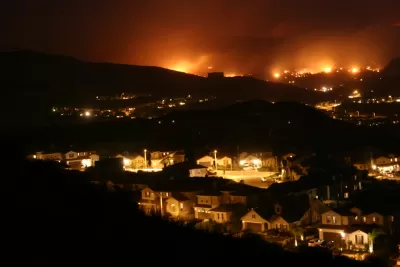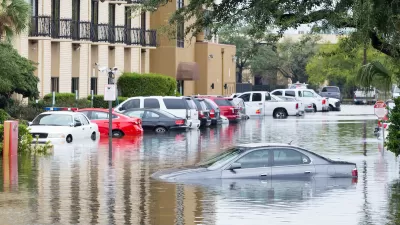The one-year moratorium is a stopgap measure to assist homeowners affected by recent wildfires as the state assesses ways of addressing the root causes of increasingly damaging natural disasters.

In an effort to help homeowners affected by recent wildfires, writes Dale Kasler, California has imposed a one-year ban on insurance companies dropping homeowners in recent fire zones from their insurance policies. The moratorium, which includes areas affected by the Dixie, Caldor, and other 2021 fires, "came a month after Lara imposed a similar moratorium affecting 25,000 homeowners who live in the vicinity of the Lava and Beckwourth Complex fires."
The ban includes parts of 22 Northern California counties and about 325,000 homeowners, but Insurance Commissioner Ricardo Lara "acknowledged that the moratorium isn’t a cure-all for the breakdown of the property-casualty insurance market in areas prone to wildfires," but rather short-term relief for a long-standing crisis. "The insurance commissioner has been negotiating with the industry to find ways to stabilize the rural markets," where homeowners often have to resort to the state's FAIR plan, "which sells bare-bones policies that insure only against wildfire risk. By the time they’re finished purchasing separate policies covering burglary and other perils, their annual insurance bill has doubled or tripled, costing them thousands."
"Among other things, negotiators are trying to establish standards for home and community “hardening” — including fuel breaks, building retrofits and other measures — that would bring insurers back into areas they’ve been deserting."
FULL STORY: California halts insurance cancellations in major wildfire areas across 22 counties

Manufactured Crisis: Losing the Nation’s Largest Source of Unsubsidized Affordable Housing
Manufactured housing communities have long been an affordable housing option for millions of people living in the U.S., but that affordability is disappearing rapidly. How did we get here?

Americans May Be Stuck — But Why?
Americans are moving a lot less than they once did, and that is a problem. While Yoni Applebaum, in his highly-publicized article Stuck, gets the reasons badly wrong, it's still important to ask: why are we moving so much less than before?

Using Old Oil and Gas Wells for Green Energy Storage
Penn State researchers have found that repurposing abandoned oil and gas wells for geothermal-assisted compressed-air energy storage can boost efficiency, reduce environmental risks, and support clean energy and job transitions.

Minneapolis Bans Rent-Setting Software
Four cities have enacted restrictions on algorithmic software that can inflate rent costs.

Oakland to Add 244 New EV Chargers
Oakland plans to launch its new charging network at eight locations by the end of 2025.

Jane Goodall Inspires with Message of Hope, Resilience, and Environmental Action
Speaking in Pasadena, Jane Goodall offered a hopeful and inspirational message, urging global compassion, environmental responsibility, and the power of individual action to shape a better future.
Urban Design for Planners 1: Software Tools
This six-course series explores essential urban design concepts using open source software and equips planners with the tools they need to participate fully in the urban design process.
Planning for Universal Design
Learn the tools for implementing Universal Design in planning regulations.
Heyer Gruel & Associates PA
City of Moreno Valley
Institute for Housing and Urban Development Studies (IHS)
City of Grandview
Harvard GSD Executive Education
Salt Lake City
NYU Wagner Graduate School of Public Service
City of Cambridge, Maryland





























